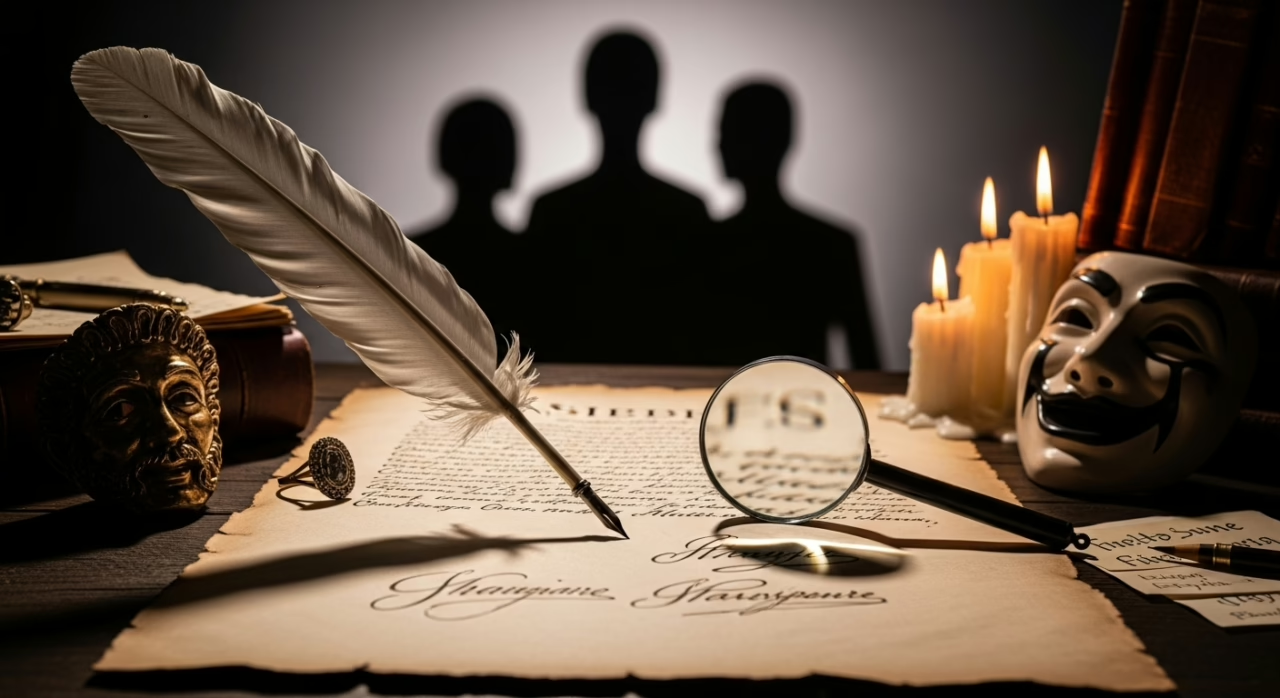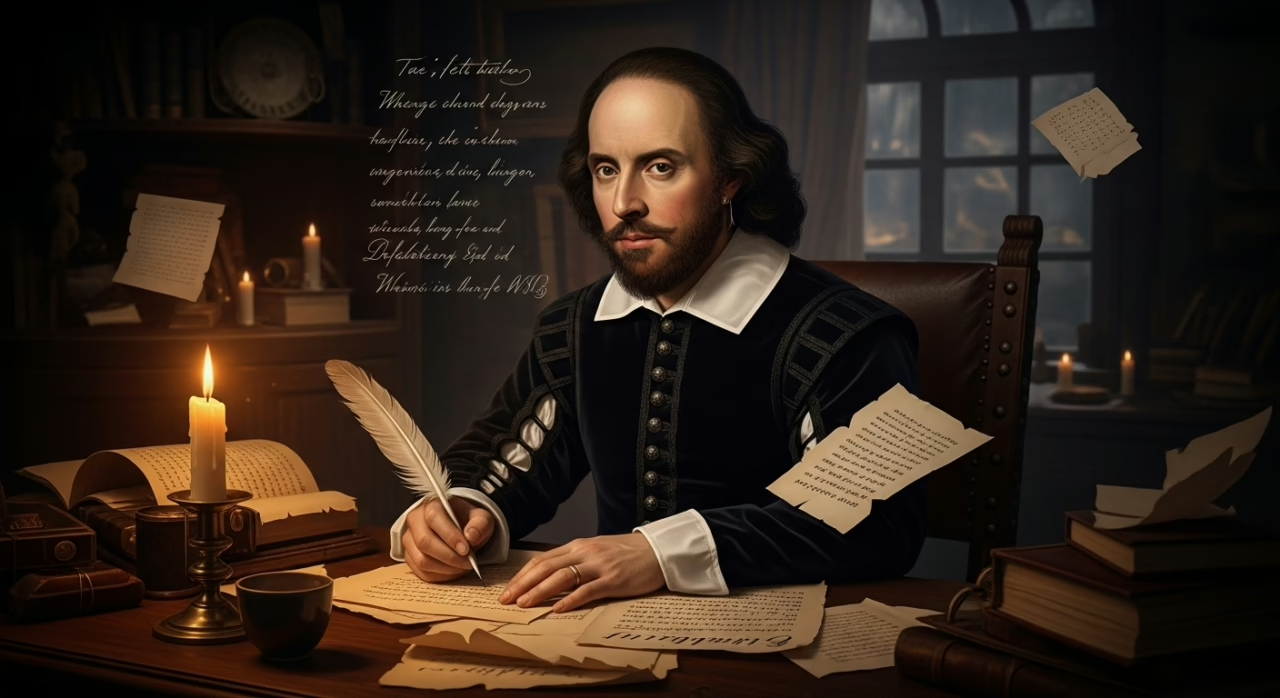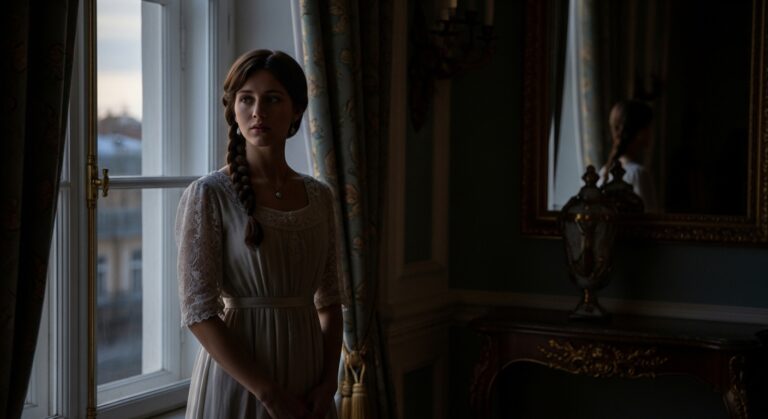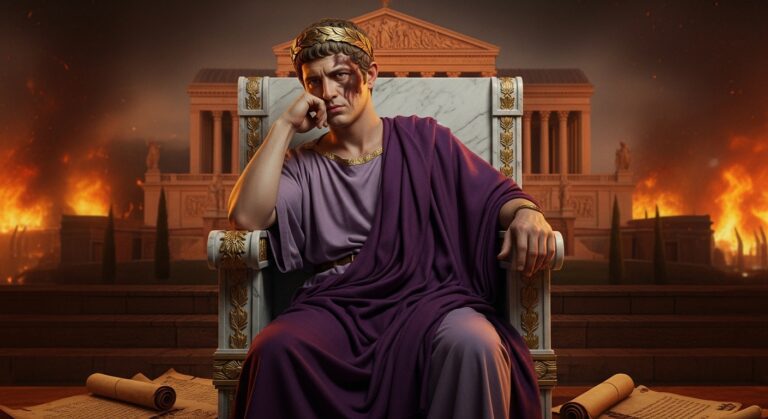William Shakespeare Authorship Mystery: Who Wrote His Works?

Did Shakespeare Really Write His Masterpieces? – One of literary history’s most enduring enigmas centers on whether William Shakespeare, the glover’s son from Stratford, genuinely authored the works bearing his name.
Scholars have identified curious discrepancies between his documented education and the erudition displayed in the canon.
Alternative candidates—nobility like Edward de Vere, intellectuals like Francis Bacon, or fellow playwrights like Christopher Marlowe—each present compelling if incomplete cases.
The controversy transcends mere historical curiosity; it challenges fundamental assumptions about genius, class, and the very nature of creative identity.
TL;DR
Hide- Historical records confirm Shakespeare of Stratford as a businessman and actor in London's theater world.
- The authorship controversy emerged in the 19th century, questioning how Shakespeare's background yielded such literary sophistication.
- Main alternative candidates include Edward de Vere (17th Earl of Oxford), Sir Francis Bacon, and Christopher Marlowe.
- Oxfordians cite de Vere's aristocratic education and travels that align with knowledge displayed in Shakespeare's works.
- Despite ongoing debate, scholarly consensus maintains that William Shakespeare is the primary author of the attributed works.
The Question of William Shakespeare’s True Identity
The enigma surrounding William Shakespeare’s identity has perplexed scholars for centuries, with historical records revealing surprisingly little about the man who created Western literature’s most enduring works.
While documented evidence confirms a William Shakespeare was born in Stratford-upon-Avon in 1564 and died there in 1616, the conspicuous gaps in his educational background and literary connections have fueled speculation about whether this provincial actor truly authored the sonnets and plays attributed to him.
The authorship controversy emerged in earnest during the nineteenth century, when scholars began questioning how someone of Shakespeare’s modest background could possess the extensive knowledge of law, foreign languages, court politics, and classical literature so evident throughout the Shakespearean canon.
Who Was William Shakespeare, Really?
The historical figure known as William Shakespeare—born in Stratford-upon-Avon in 1564, married to Anne Hathaway, and father to three children—presents scholars with a paradoxical enigma when reconciling his modest education and provincial life with the extraordinary literary achievements attributed to him.
Biographical records indicate a man of business dealings, property acquisitions, and legal disputes, yet conspicuously absent are manuscripts, correspondence with contemporaries, or evidence of the classical education seemingly prerequisite for works demonstrating such intimate knowledge of law, foreign lands, and court politics.
- John Deydras: The Curious Case of a False King
- Mystery of the Man in the Iron Mask Solved?
- The Enigma of Nikola Tesla: Genius, Visionary, or Mad Scientist?
- Dr. John Dee: Scholar, Occultist, or Both?
- The Story of Robin Lee Graham: Sailing the Oceans Alone at Sixteen
- Tamerlane: Legendary Conqueror or Brutal Monster?
This disconnect between the documented tradesman of Stratford and the sophisticated author whose plays and sonnets reveal mastery of subjects seemingly beyond his reach has fueled centuries of speculation regarding whether Shakespeare truly penned the works bearing his name.
Brief Biography of the Man from Stratford
William Shakespeare of Stratford-upon-Avon, baptized on April 26, 1564, remains one of history’s most celebrated yet enigmatic literary figures, whose documented biography contains surprising gaps that have fueled centuries of debate.
His Stratford upbringing, early marriage to Anne Hathaway, subsequent acting career in London, diverse literary influences, and intermittent family life create a biographical framework that, while factually substantiated, leaves scholars questioning the genesis of his extraordinary talent.
Discrepancies Between Life and Works
Although documented evidence confirms Shakespeare’s existence as a Stratford businessman, actor, and shareholder in London’s theatrical companies, profound discrepancies between his biographical record and the encyclopedic knowledge displayed in his works have sparked centuries of skepticism about his authorship.
The historical context analysis reveals striking literary knowledge gaps that seem incongruous with his limited formal education.
These biographical inconsistencies, particularly regarding social class implications, fuel the enduring mystery.
Origin of the Authorship Debate
The Shakespeare authorship controversy, though reaching its zenith in the nineteenth century, traces its origins to subtle expressions of doubt that emerged decades after the Bard’s death in 1616.
Early skeptics, significantly Reverend James Wilmot in the 1780s, questioned how a man of Shakespeare’s modest education could demonstrate such extensive knowledge of law, foreign languages, and court politics throughout his works.
These initial murmurings of disbelief gained momentum during the Victorian era, when biographical inconsistencies—the scarcity of personal documents, contradictory signatures, and the peculiar terms of his will—coalesced into a legitimate scholarly debate that continues to provoke academic discourse today.
Historical Doubts and Early Skepticism
Skepticism regarding the Stratfordian authorship first emerged during the Victorian era, nearly two centuries after William Shakespeare’s death, when literary critics began questioning how a man of seemingly limited formal education could produce works of such profound erudition and philosophical depth.
These historical skepticism patterns reflected shifting cultural perceptions about genius and authenticity within Elizabethan context, establishing the foundation for competing authorship theories that would later flourish in literary criticism circles.
Why People Began to Question Shakespeare’s Identity
When exactly did Shakespeare’s identity become contested terrain in literary discourse?
The authorship question emerged in earnest during the mid-19th century, when Shakespearean scholarship underwent an identity crisis concerning his literary legacy.
Historical context revealed biographical inconsistencies that challenged cultural significance attributions—specifically, how a commoner with limited education could produce works displaying extensive knowledge of law, foreign languages, and aristocratic customs.
Main Authorship Candidates
Several prominent figures emerge as potential authors of Shakespeare’s works, each with compelling biographical attributes that align with the plays’ sophisticated knowledge and literary brilliance.
Edward de Vere, the 17th Earl of Oxford, stands as the foremost candidate due to his aristocratic education, extensive travels through Italy (where many Shakespearean plays are set), and documented poetic abilities.
Sir Francis Bacon and Christopher Marlowe—the former a scholarly philosopher with legal expertise reflected in the plays, the latter a celebrated playwright whose supposed death in 1593 some theorists question—round out the trinity of alternative authorship contenders most frequently championed by skeptics of the Stratfordian attribution.
Edward de Vere, Earl of Oxford: Leading Contender
Edward de Vere, the 17th Earl of Oxford, emerges as perhaps the most compelling alternative candidate for Shakespearean authorship, with proponents citing his extensive education, continental travels, and privileged position in Elizabethan court culture as qualifications for producing the sophisticated literary corpus.
Oxfordians highlight remarkable parallels between de Vere’s life experiences and Shakespeare’s works, particularly emphasizing biographical connections to Hamlet and the Italian settings that feature prominently in numerous plays.
However, significant chronological inconsistencies present formidable obstacles to the Oxford theory, most importantly de Vere’s death in 1604, several years before Shakespeare’s final plays were written and performed.
Evidence Supporting the Oxfordian Theory
Among all potential claimants to Shakespeare’s literary crown, the Oxfordian theory—championing Edward de Vere, 17th Earl of Oxford—stands as perhaps the most meticulously researched and passionately defended alternative attribution in the authorship controversy.
The Oxfordian arguments rest upon several compelling foundations:
- Oxford’s extensive literary credentials and education
- Historical evidence linking his travels to Shakespearean settings
- Biographical parallels embedded in the canonical works
- Controversial theories regarding aristocratic authorial intent
Arguments Against Oxford as Shakespeare
Despite the Oxfordian theory‘s fervent champions and meticulous research, significant chronological inconsistencies and evidentiary gaps challenge de Vere’s candidacy as the true author of Shakespeare’s works.
Oxford’s limited experience with common life, educational background discrepancies, and absence of personal connection to Stratford further undermine his case.
Additionally, political motivations among certain advocates, rather than compelling evidence, have often propelled this alternative attribution.
Sir Francis Bacon: Scholar and Philosopher
Sir Francis Bacon, renowned Renaissance polymath whose intellectual legacy spans law, science, and philosophy, stands as another significant contender in the Shakespeare authorship debate.
Proponents of the Baconian theory point to his unparalleled erudition and familiarity with the law, sciences, and classical literature—knowledge domains pervasively reflected throughout the Shakespeare canon.
The case for Bacon draws strength from cryptographic “evidence” allegedly embedded in the plays, alongside striking philosophical parallels between his acknowledged works and the worldview articulated in Shakespeare’s dramas.
Bacon’s Literary and Intellectual Credentials
The intellectual giant of the Elizabethan age, Francis Bacon possessed credentials that make him a compelling candidate in the Shakespeare authorship controversy.
Bacon’s writings demonstrate remarkable philosophical depth comparable to Shakespeare’s works. His credentials include:
- Classical education reflecting Shakespeare’s extensive literary references
- Legal knowledge pervading the plays’ courtroom scenes
- Philosophical framework mirroring Shakespearean themes
- Documented intellectual connections to Shakespeare’s contemporaries
Key Points in the Baconian Theory
Why does the Baconian theory persist as one of the most enduring explanations for Shakespeare’s authorship mystery?
Baconian arguments rest upon compelling literary parallels between Shakespeare’s works and Bacon’s philosophical writings, situated within their shared historical context.
Proponents suggest Bacon’s motivations included political necessity and class constraints, while concealing his authorship behind Shakespeare’s name—implications that challenge conventional literary history and aristocratic-commoner dynamics in Elizabethan England.
Christopher Marlowe: Playwright and Spy
Christopher Marlowe, a gifted Elizabethan playwright and alleged spy for the Crown, figures prominently in alternative Shakespeare authorship theories that propose his death in 1593 was elaborately staged.
Proponents of the Marlovian theory suggest Marlowe escaped to continental Europe, where he continued writing under the pseudonym “William Shakespeare,” explaining the sudden emergence of Shakespeare’s sophisticated works shortly after Marlowe’s supposed demise.
This hypothesis, while intriguing, faces substantial challenges, including the difficulty of maintaining such an extensive conspiracy during an era of intense surveillance, and the fundamental question of why the government would protect a controversial playwright after allegedly arranging his escape.
The Marlovian Theory and the Faked Death Scenario
Among the most compelling alternative theories in the Shakespeare authorship debate stands the Marlovian hypothesis, which posits that acclaimed Elizabethan playwright Christopher Marlowe did not perish in 1593 as officially recorded, but rather staged his death and subsequently penned the works attributed to William Shakespeare.
- Marlowe’s literary influence mirrors Shakespeare’s stylistic evolution
- Elizabethan spy networks afforded mechanisms for identity concealment
- Death conspiracy theories cite inconsistencies in coroner’s report
- Authorship legacy debate intensified through textual analysis of both canons
Challenges Facing the Marlowe Hypothesis
The Marlovian theory, despite its alluring narrative of secret identities and faked deaths, faces substantial evidentiary hurdles that challenge its credibility within academic Shakespearean discourse.
Marlowe’s secret life, while fascinating, contradicts the historical context of Elizabethan playwright rivalries.
Literary contemporaries never hinted at such authorship implications, and documented interactions between these figures further undermine the hypothesis that Shakespeare was merely Marlowe’s elaborate disguise.
Analyzing the Evidence
Scholars examining the Shakespeare authorship question often scrutinize linguistic patterns, vocabulary breadth, and stylistic fingerprints across contested works to identify consistencies or anomalies that might reveal the true writer.
Some researchers claim to have uncovered encrypted messages or ciphers within the texts themselves—hidden signatures allegedly pointing to Francis Bacon, Edward de Vere, or other candidates—though such evidence remains hotly disputed among academic circles.
The sociopolitical environment of Elizabethan and Jacobean England further complicates attribution, as the intimate knowledge of court life, legal terminology, and Continental customs displayed in the works suggests an author of privileged background and education, potentially inconsistent with the documented biography of the Stratford man.
Literary Style and Vocabulary Clues
Scholars examining the Shakespeare authorship question have scrutinized linguistic patterns across the Bard’s works, comparing them with the documented writings of alternative candidates like Francis Bacon, Edward de Vere, and Christopher Marlowe.
Stylometric analyses reveal distinctive vocabulary choices, rhetorical structures, and regional dialectical influences that either strengthen or undermine various attribution theories.
The presence of specialized knowledge—whether legal terminology, Italian geography, or courtly customs—provides vital evidence when juxtaposed against the known biographical details and preserved writings of those proposed as the “true Shakespeare.”
Comparing Shakespeare’s Works to Candidates’ Writings
Numerous stylometric studies have compared the linguistic fingerprints of Shakespeare’s canon with the written works of authorship candidates, revealing patterns that both challenge and reinforce traditional attribution.
Textual analysis continues to yield compelling evidence through:
- Vocabulary similarities between Oxford’s personal letters and Shakespearean sonnets
- Stylistic differences in sentence structure among principal candidates
- Literary comparisons of metaphorical patterns across contested works
- Authorship theories supported by distinctive rhetorical devices
Language, Dialects, and Vocabulary Matches
Three distinctive linguistic features in Shakespeare’s works provide essential insights into the authorship question when examined alongside candidates’ documented vocabularies.
Detailed linguistic analysis reveals dialectical differences between Stratfordian patterns and aristocratic contemporaries.
Vocabulary usage across poetic forms demonstrates remarkable consistency, while stylistic comparisons highlight idiosyncratic flourishes that scholars track through computational methods—creating fingerprints as distinctive as the author’s own handwriting.
Hidden Messages and Ciphers
Cryptographic enthusiasts studying Shakespeare’s works have long proposed that encrypted messages, concealed within the text itself, might reveal the true author’s identity. Notable examples include the Baconian theory, which suggests Sir Francis Bacon embedded binary ciphers into the original folio’s typography, and the discovery of apparent anagrams in sonnets that, when rearranged, allegedly form Edward de Vere’s signature.
These purported cryptographic findings, while fascinating to authorship skeptics, have been met with robust criticism from traditional scholars who maintain that such “discoveries” often result from selective pattern recognition rather than intentional encoding.
Claims of Secret Codes within Shakespeare’s Texts
Why have Shakespeare’s texts become the subject of intense cryptographic scrutiny, with scholars and enthusiasts alike searching for hidden messages that might reveal the “true” author?
- Literary codes allegedly concealing Francis Bacon’s name
- Purported secret symbols pointing to Edward de Vere
- Cipher analysis methods revealing supposed cryptograms
- Text interpretation strategies detecting acrostics and patterns
Famous Examples Explored
Among the most compelling instances of purported cryptographic evidence in the Shakespeare authorship debate are several famous examples that merit close examination.
The Baconian theory, for example, compares writing practices of famous playwrights, suggesting hidden signatures woven into texts.
Contemporary authorship debates often highlight how the influence of anonymity shaped alternative literary theories, challenging historical writing practices while revealing potential hidden identities through methodical textual analysis.
Historical and Social Contexts
The social stratification of Elizabethan England presents a formidable challenge to traditional Shakespearean attribution, as skeptics question how a glover’s son from Stratford could possess the sophisticated knowledge of aristocratic customs, legal principles, and court politics evident throughout the plays.
Shakespeare’s works reveal an intimate familiarity with legal terminology and concepts—from precise contractual language in “The Merchant of Venice” to nuanced inheritance laws in “King Lear”—suggesting either formal training or extraordinary access to specialized knowledge unavailable to most commoners.
Additionally, his detailed descriptions of Italian cities, French customs, and Danish court life prompt scholars to examine whether the historical William Shakespeare had opportunities to acquire such geographically diverse knowledge or if these elements indicate authorship by someone with documented continental travel experience.
Class and Education Arguments
Critics of William Shakespeare’s authorship often center their arguments on perceived incongruities between his social standing, educational background, and the extraordinary literary achievements attributed to him.
The class disparities of Elizabethan England raise questions about his intellectual development:
- Lack of university education unlike contemporaries in the literary elite
- Rural tradesman social status seemingly incongruous with courtly knowledge
- Limited access to educational resources in Stratford
- Sophisticated literary influences requiring extensive classical learning
Knowledge of Law, Science, and Foreign Lands
While Shakespeare enthusiasts celebrate his seemingly inexhaustible knowledge of law, medicine, astronomy, and foreign lands, skeptics question how a provincial glover’s son acquired such specialized expertise.
His plays demonstrate extraordinary legal knowledge, scientific understanding of contemporary theories, and intimate cultural exposure to Italian customs.
This intellectual breadth, particularly his detailed foreign experiences, fuels debate about whether formal education alone could explain such extensive worldliness.
The Stratfordian Defense: Shakespeare Himself
While anti-Shakespearean theories often flourish in the absence of thorough biographical information, contemporary records firmly establish William Shakespeare of Stratford-upon-Avon as the author of the works attributed to him.
Historical documents—including payment records, legal proceedings, and contemporaneous references from fellow writers like Ben Jonson—create an evidential constellation that renders alternative authorship claims unnecessary complications rather than plausible alternatives.
The mythological notion that Shakespeare lacked the education or worldliness to produce literary masterpieces overlooks both the accessibility of classical knowledge through translations and the extraordinary observational gifts that have distinguished exceptional writers throughout literary history.
Evidence from Historical Records
Contemporary records offer compelling evidence for William Shakespeare of Stratford as the author of the works bearing his name, including legal documents that connect him explicitly to London’s theatrical world.
The Stratfordian position is further strengthened through archaeological findings and parish records that trace Shakespeare’s life trajectory from Warwickshire to his rise in London’s theater scene and eventual retirement to Stratford.
Numerous references to his plays in contemporaneous accounts, combined with personal connections mentioned in his will—such as bequests to fellow actors—establish a coherent narrative that reconciles the historical Shakespeare with the literary genius whose works continue to captivate audiences centuries later.
Documents Supporting the Stratfordian Viewpoint
Despite centuries of debate surrounding Shakespeare’s authorship, proponents of the Stratfordian position—those who maintain William Shakespeare of Stratford-upon-Avon wrote the works attributed to him—present compelling documentary evidence from the historical record.
- Payment records from the Lord Chamberlain’s Men listing “William Shakespeare” as playwright
- Ben Jonson’s explicit contemporary references to Shakespeare’s literary connections
- Legal documents establishing his professional theater involvement
- The First Folio (1623) testimonials attesting to his authorial intentions
Shakespeare’s Life Connections to His Works
Connections between Shakespeare’s personal experiences and the content of his plays provide perhaps the most convincing evidence for Stratfordian attribution claims.
His works reflect intimate knowledge of Warwickshire customs and locations, while Shakespearean themes often mirror his documented life events.
Character parallels emerge between historical figures he encountered and his dramatic personas.
Literary influences from his education and historical context of Elizabethan England permeate his canon, revealing an authentic biographical imprint.
Debunking Authorship Myths
Stratfordians regularly confront an arsenal of misconceptions about Shakespeare’s education, vocabulary, and legal knowledge—claims that systematically overstate what would be required to write his works while understating what a shrewd, observant middle-class man in Elizabethan England might acquire through practical experience.
The documentary evidence connecting Shakespeare of Stratford to the plays and poems attributed to him forms an interlocking network of contemporary references that, while not individually conclusive, collectively presents a formidable case that Occam’s razor supports.
Most Shakespeare scholars consider the authorship question settled not from intellectual gatekeeping but because the weight of historical evidence favors the simplest explanation: the plays were written by the man whose name appears on them.
Addressing Common Misconceptions and False Claims
Although popular anti-Stratfordian claims persist in questioning William Shakespeare’s authorship, a dispassionate examination of historical evidence consistently dismantles these skeptical theories.
Several misconceptions require clarification:
- The “education myth” falsely asserts Shakespeare lacked sufficient learning.
- Claims of “no manuscripts” ignore period-typical preservation patterns.
- Literary misunderstandings about vocabulary breadth overlook historical context.
- False assertions about Shakespeare’s authorship ignore contemporary attributions.
Why Stratfordians Believe the Debate is Unnecessary
For mainstream Shakespeare scholars and literary historians, the authorship debate represents a curious phenomenon that persists despite overwhelming contemporary evidence supporting William Shakespeare of Stratford as the playwright behind the celebrated works.
Within proper historical context, they argue, authorship relevance diminishes against Shakespeare’s literary legacy—the debate significance merely distracts from genuine scholarship, diluting cultural perceptions of texts that transcend questions of authorship.
Modern Scholarship and New Discoveries
Modern examination of Shakespeare’s works has entered a new phase with computational stylometry, handwriting analysis, and chemical testing of original folios revealing patterns consistent with the traditional attribution.
The academic consensus, while still strongly favoring William Shakespeare of Stratford, acknowledges nuanced possibilities of collaboration that were common in Elizabethan theater, particularly in later works like “Henry VIII.”
Recent discoveries—including annotations in Shakespeare’s personal Bible and previously unexamined legal documents from the Warwickshire archives—continue to present scholars with fresh perspectives on the authorship question, requiring integration into the centuries-old debate.
Advances in Textual Analysis and Forensics
Modern computational technologies have revolutionized Shakespeare authorship studies, enabling scholars to analyze linguistic patterns and stylistic markers with unprecedented precision.
Recent stylometric analyses, conducted by researchers at Oxford and Harvard Universities, have identified distinctive vocabulary distributions and syntactical fingerprints across the Shakespearean canon, challenging traditional attributions while reinforcing others.
These forensic textual investigations, when combined with historical document authentication techniques, illuminate the Shakespeare mystery through evidential parameters previously inaccessible to generations of literary historians.
Using Modern Technology to Solve the Mystery
How profoundly has twenty-first century technology transformed our approach to the Shakespeare authorship question?
Digital forensics and machine learning have revolutionized scholarly investigation, illuminating previously invisible linguistic patterns. Text analysis algorithms, coupled with sophisticated data visualization techniques, reveal authorial fingerprints with unprecedented precision.
- Stylometric software comparing vocabulary distributions across contested works
- Computational linguistics identifying unique sentence structures
- Neural networks detecting subtle authorial markers
- Digital archives enabling thorough cross-referencing of contemporaneous texts
Recent Studies and Their Findings
Though scholars have debated the authorship question for centuries, recent findings published between 2018 and 2023 have yielded remarkable findings that challenge traditional assumptions about Shakespeare’s canon.
Sophisticated computational literary analysis has revealed distinctive stylometric patterns, while reexamined historical contexts suggest collaborative practices were more common than previously acknowledged.
Academic perspectives now increasingly embrace nuanced authorship theories that transcend simplistic binary attributions.
Current Consensus and Ongoing Debates
Despite widespread critical consensus among academic Shakespeareans that William Shakespeare of Stratford penned the works attributed to him, a persistent minority continues to question this orthodoxy with varying degrees of scholarly rigor.
The debate persists partly due to the relatively sparse biographical documentation of Shakespeare’s life—a common circumstance for non-aristocratic Elizabethans—which creates interpretive gaps that alternative theorists enthusiastically fill with speculative narratives about Francis Bacon, Edward de Vere, or Christopher Marlowe.
Contemporary scholarship, while generally dismissive of anti-Stratfordian positions, acknowledges that the questions raised about authorship have inadvertently enriched the field by prompting more thorough historical investigations into collaborative writing practices, the nature of Renaissance authorship, and the socio-cultural contexts of Elizabethan theatrical production.
Scholarly Opinion Today
Consensus within modern Shakespearean scholarship remains overwhelmingly supportive of William Shakespeare of Stratford-upon-Avon as the primary author of the works attributed to him, despite persistent challenges from alternative authorship theories.
Contemporary scholarly opinion, informed by historical context and literary analysis, has solidified around several key points:
- Documentary evidence connecting the historical Shakespeare to the theatrical world
- Stylometric analyses confirming consistent authorial patterns
- Contemporaneous attributions from fellow writers
- Absence of compelling period evidence suggesting alternative authorship
Why the Mystery Persists
The endurance of the Shakespeare authorship controversy represents a remarkable intersection of academic debate, cultural mythology, and the human drive to question established narratives.
This persistent historical intrigue stems from gaps in biographical records and the extraordinary literary legacy in question.
Cultural fascination with identity exploration continues to fuel authorship theories, despite scholarly consensus, as the mystery offers both intellectual challenge and the allure of rewriting canonical history.
Cultural Impact of the Shakespeare Authorship Debate
The Shakespeare authorship controversy has permeated literature, theater, and film, with works ranging from Mark Twain’s “Is Shakespeare Dead?” to Roland Emmerich’s film “Anonymous” examining alternative attribution theories.
This cultural fascination reveals deeper questions about how we perceive artistic creation, genius, and the relationship between biography and literary interpretation.
Beyond mere academic debate, the authorship question has become a lens through which successive generations explore tensions between established authority and revisionist impulses in literary history, challenging fundamental assumptions about canonical texts and their origins.
Influence on Literature and Popular Culture
The Shakespeare authorship debate has transcended academic circles to permeate popular culture through numerous books, films, and theatrical productions, including Roland Emmerich’s controversial film “Anonymous” and Amy Scott-Robinson’s play “The Shakespeare Conspiracy.”
This longstanding controversy continues to captivate audiences precisely because it combines intellectual puzzles with questions about creative genius, class barriers, and the nature of artistic identity.
The mystery’s enduring appeal rests in how it transforms Shakespeare from a remote historical figure into the central character of a compelling narrative that challenges our understanding of literary history and authenticity.
Books, Films, and Plays Inspired by the Mystery
Throughout the centuries following Shakespeare’s death, countless creative works have emerged from the fertile ground of the authorship controversy, transforming scholarly debate into artistic expression across multiple media.
These creative responses manifest in various forms:
- Historical fiction novels exploring alternative authorship theories
- Literary adaptations reimagining the Bard’s true identity
- Films dramatizing cultural interpretations of evidence
- Theatrical productions examining the mystery with self-referential irony
Why the Debate Continues to Captivate Audiences
Despite centuries of scholarship and abundant historical evidence supporting William Shakespeare of Stratford as the author of the celebrated plays and sonnets, the authorship controversy maintains its powerful grip on cultural imagination for reasons that transcend mere literary curiosity.
This cultural fascination reflects our collective identity exploration within shifting historical contexts, where literary intrigue serves as both intellectual puzzle and audience engagement tool, allowing each generation to reimagine Shakespeare through their own interpretive frameworks.
Importance for Understanding Literary History
The Shakespeare authorship controversy illuminates shifting conceptions of artistic creation, questioning whether genius emerges from individual biography or collaborative networks of influence.
These debates, far from merely contesting historical facts, reshape how scholars approach textual analysis, cultural context, and the very notion of literary canonization.
What the Mystery Teaches Us About Authorship and Identity
While scholars continue debating who penned Shakespeare’s timeless works, the authorship controversy itself reveals profound insights about our cultural understanding of creativity, identity, and historical attribution.
The mystery transcends mere literary legacy, illuminating broader implications:
- Identity exploration across socioeconomic boundaries
- Cultural significance of authorship theories in different eras
- Historical context shaping attribution practices
- Evolving definitions of intellectual ownership through centuries
Broader Implications for Literary Study
Far beyond academic circles, the Shakespeare authorship debate resonates throughout literary studies as a powerful lens through which scholars examine fundamental questions about canonical formation, textual analysis, and the politics of literary reputation.
This controversy illuminates issues of literary authenticity within historical context, challenging how we construct cultural significance.
Authorship theories invite deeper identity exploration, liberating texts from biographical constraints while reframing our understanding of creative genesis and intellectual heritage.
Wrapping Up
The authorship question, like Shakespeare’s own quill—hovering perpetually between ink and parchment—remains suspended in scholarly debate.
While evidence increasingly affirms the Stratfordian view, the controversy’s persistence illustrates our collective yearning to comprehend genius.
Perhaps the true legacy lies not in resolving this centuries-old enigma, but in how it compels us to interrogate the nature of creativity itself, ever elusive, like Prospero’s vanishing footprints upon the shore.
- Bate, J. (2008). Soul of the age: A biography of the mind of William Shakespeare. Random House.
- Dawson, A. (2010). Shakespeare and the problem of biography. In M. DeGrazia & P. Cheney (Eds.), The Cambridge companion to Shakespeare’s poetry (pp. 20–36). Cambridge University Press.
- Dobson, M. (2001). The making of the national poet: Shakespeare, adaptation and authorship, 1660–1769. Oxford University Press.
- Greenblatt, S. (2005). Will in the world: How Shakespeare became Shakespeare. W. W. Norton & Company.
- Hope, J. (1994). The authorship of Shakespeare’s plays: A socio-linguistic study. Cambridge University Press.
- Love, H. (2002). Attributing authorship: An introduction. Cambridge University Press.
- Nelson, A. H. (2011). Monstrous adversary: The life of Edward de Vere, 17th Earl of Oxford. Liverpool University Press.
- Price, D. (2013). Shakespeare’s unorthodox biography: New evidence of an authorship problem. ShakesVere Press.
- Rasmussen, E., & West, J. (Eds.). (2012). The Shakespeare Thefts: In Search of the First Folios. Palgrave Macmillan.
- Shapiro, J. (2010). Contested Will: Who Wrote Shakespeare? Simon & Schuster.
- Taylor, G., & Egan, G. (Eds.). (2006). The Oxford Shakespeare: The complete works (2nd ed.). Oxford University Press.
- Vickers, B. (2002). Shakespeare, Co-Author: A Historical Study of Five Collaborative Plays. Oxford University Press.
- Wells, S., & Edmondson, P. (Eds.). (2013). Shakespeare beyond doubt: Evidence, argument, controversy. Cambridge University Press.
- Whalen, R. F. (1994). Shakespeare: Who was he? The Oxford challenge to the Bard of Avon. Praeger.
- Zim, R. (2005). Shakespeare and the historians. In C. M. S. Alexander & S. Wells (Eds.), Shakespeare and English Renaissance literature in performance (pp. 121–136). Cambridge University Press.






